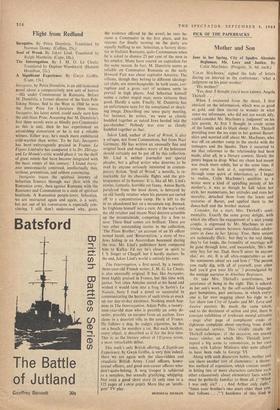Flight from Redland
A Significant Experience. By Gwyn Griffin. (Cape, 15s.)
Incognito, by Petru Dumitriu, is an old-fashioned novel about a comparatively new sort of horror —life under Communism in Rumania. Before M. Dumitriu, a former director of the State Pub- lishing House, fled to the West in 1960 he won the State Prize for Literature three times. incognito, his latest novel, could easily earn him the anti-State Prize. Assuming that M. Dumitriu's first three novels were as blindly pro-Communist as this is anti, then he has experienced an astonishing conversion or he is not a reliable witness. Either way, he's much more embittered cold-warrior than writer. To be fair, Incognito has been extravagantly praised in France. Le Figaro Litteraire has compared it to Dr. Zhivago and Le Monde's critic would place it 'on the shelf of great novels that have become integrated with the basic events of this century.' I found Incog- nito unnecessarily contrived, intellectually thin, verbose, pretentious, and seldom convincing.
Incognito traces the spiritual journey of Sebastian lonesco through war (first with the Rumanian army, then against Rumania with the Russians) and Communism to a state of spiritual beatitude. A Rumanian people-lover, Sebastian, we are instructed again and again, is a saint, but not one of his conversions is especially con- vincing. I still don't understand why, given the evidence offered by the novel, he ever be- came a Communist in the first place, and his reasons for finally turning on the party are equally baffling to me. Sebastian, a factory direc- tor in Stalinist Rumania, quits Communism when he is asked to dismiss 25 per cent of the men in his employ. Many have soured on capitalism for the same reason. In fact, M. Dumitriu seems as reliable on Communist Rumania as the early Howard Fast was about capitalist America. The villains, though they belong to different ideologi- cal clubs, are interchangeable. In both cases, cor- ruption and a gross sort of sexiness seem to prevail in high places. And Sebastian himself seems a rather stupid man, more virtuous than good. Hardly a saint. Finally, M. Dumitriu has an unfortunate taste for the sensational or shock- ing image. Describing one tense party meeting, for instance, he writes, 'we were as closely huddled together as naked Jews herded into the gas-chamber.' Nobody was ever ' as closely huddled together as that.
Jakov Lind, author of Soul of Wood, is also a refugee, not from Communism, but from Nazi Germany. He has written an unusually fine and original book and readers weary of the holocaust should certainly not be put off by this collection. Mr. Lind is neither journalist nor special pleader, but a gifted writer who deserves to be read by anyone seriously interested in contem- porary fiction. 'Soul of Wood,' a novella, is re- markable for its chassidic flights and the gro- tesqueness of its humour. It is, like all Mr. Lind's stories, fantastic, horrible yet funny. Anton Barth, paralysed from the head down, is betrayed by an old family retainer when his parents are carted off to a concentration camp. He is left to die in an abandoned hut on a mountain top. Instead, he frightens himself into a cure. At the war's end, the old retainer and insane Nazi doctors scramble up the mountainside, competing for a Jew, to save. These final scenes are brilliant. There are two other outstanding stories in the collection, The Pious Brother,' an account of an SS officer turned Jesuit, and 'Regurrection,' a story of two Jews hiding in an Amsterdam basement during the war. Mr. Lind's publishers have compared him to Kafka. I'd say he's closer in spirit to I. S. Singer or Chagall, but it hardly matters. In the end, Jakov Lind's world is entirely his own.
The Interrogation, a first- novel, by a twenty- three-year-old French writer, J. M. G. Le Clezio, is also unusually original. It has, like Incognito, been highly praised in France, but this time with justice. Not since Antoine stared at his hand and wished it would turn into a frog in Sartre's La Nausee, have I read a novel so successful in communicating the horrors of such trivia as muck up our day-to-day existence. Nothing much hap- pens in The Interrogation. Adam Polio, a twenty- nine-year-old man who is possibly an army de- serter, possibly an escapee from an asylum, lives alone in a deserted villa in the south of France. He follows a dog, he cadges cigarettes, he lies on a beach, he murders a rat. But each incident, every object, is described as if for the first time. This is, as the literary editor of l'Express wrote, a most remarkable debut.
This week's only British offering, A Significant Experience, by Gwyn Griffin, is very thin indeed. Here we are again with the class-ridden and ritualistic British Army. Cruel officers, homo- sexual officers, and good non-career officers who- don't-quite-belong. A wog trooper is subjected to a senseless, but sexually gratifying, whipping. Not even a good short story (it only runs to a 125 pages of LARGE print). More like an 'intelli- gent' TV play.
MORDECAI R1CHLER






































 Previous page
Previous page